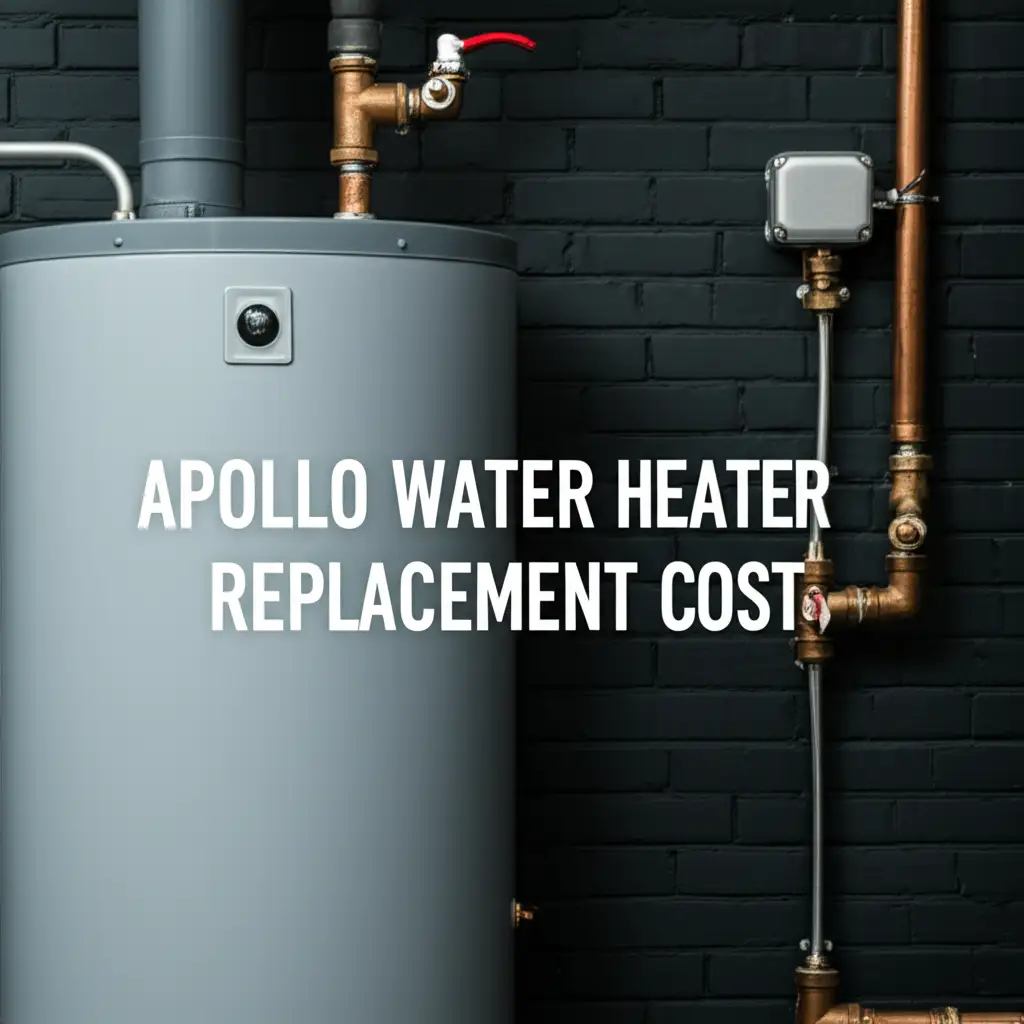· Elira Thomsen · Home Improvement · 21 min read
Apollo Water Heater Replacement Cost

Understanding Your Apollo Water Heater Replacement Cost
Imagine waking up to no hot water. It is a common problem for many homeowners. When your water heater fails, you need a solution fast. For owners of Apollo water heaters, understanding replacement costs becomes important. Apollo units are reliable, but they do not last forever. I will guide you through all cost factors. This article helps you prepare for this important home expense. We will cover unit types, labor, and hidden charges.
Takeaway
- Average Cost: Expect to pay between $900 and $2,500 for a conventional Apollo tank water heater replacement, including labor and materials.
- Tankless Premium: Tankless Apollo units cost significantly more, often ranging from $3,000 to $8,000 or higher due to complex installation.
- Key Factors: Unit type, size, energy efficiency, labor rates, and necessary system upgrades drive the final price.
- Professional Help: Always use certified professionals for safe and code-compliant installation.
Replacing an Apollo water heater typically costs between $900 and $2,500 for a conventional tank model. Tankless Apollo units range from $3,000 to $8,000 or more. This price includes the new unit, labor, and basic installation materials. The exact cost depends on your unit type, its capacity, and regional labor rates.
The Essentials of Apollo Water Heaters and Their Lifespan
Apollo water heaters provide hot water for many homes. They come in different types. Understanding these types helps you plan for replacement. Knowing their typical lifespan helps you anticipate problems.
What is an Apollo Water Heater?
Apollo is a known brand in the home appliance market. They produce various home systems, including water heaters. Their product line includes conventional tank models. They also offer modern tankless units. Each type serves the same purpose but works differently.
A tank water heater stores and heats water continuously. It keeps a reserve of hot water ready. A tankless water heater heats water on demand. It provides hot water only when you open a tap. Both have pros and cons regarding cost and efficiency.
Typical Lifespan and Signs of Failure
Most tank water heaters last 10 to 15 years. Tankless models often last longer, sometimes 20 years or more. Age is a primary factor in replacement decisions. As water heaters age, their efficiency drops. They become more prone to failures.
Common signs your Apollo water heater needs replacement include:
- Lack of Hot Water: The most obvious sign is no hot water. This means the heating element or gas burner is failing.
- Rust-Colored Water: This indicates rust inside the tank. The tank lining may be failing. This can lead to leaks.
- Leaks Around the Tank: Water leaking from the unit signals a serious problem. A leaking tank often means it needs replacement.
- Strange Noises: Popping, rumbling, or banging noises come from sediment buildup. Sediment reduces efficiency and damages the tank.
- Frequent Repairs: If you pay for repairs often, replacement is likely more cost-effective.
When these signs appear, consider getting quotes for an Apollo water heater replacement. Acting early prevents larger problems. It also ensures you maintain hot water supply without interruption.
Breaking Down the Apollo Water Heater Replacement Cost Factors
Many factors influence the total Apollo water heater replacement cost. It is not just the price of the unit itself. Labor, materials, and other charges add to the final bill. Understanding these factors helps you budget accurately.
Unit Cost: Type, Size, and Efficiency
The new water heater unit is a major part of the expense. Apollo offers various models.
- Conventional Tank Units: Prices vary by capacity. A small 30-gallon tank costs less than a large 80-gallon unit. Energy efficiency ratings (Energy Factor or EF) also impact price. More efficient models cost more upfront but save money on utilities.
- Tankless Units: These are more expensive to purchase. Their cost depends on flow rate and energy source (gas or electric). Gas tankless units generally cost more than electric ones. However, gas units often provide higher flow rates.
Choose a unit that matches your household’s hot water demand. An oversized unit wastes energy. An undersized unit leaves you without enough hot water.
Labor Costs and Installation Complexity
Labor makes up a significant portion of the replacement cost. Plumbers charge hourly rates. These rates vary by region and plumbing company.
- Standard Replacement: Replacing a unit with a similar one in the same location is typically straightforward. This keeps labor costs lower.
- Complex Installation: If the new unit requires relocation, new gas lines, or electrical work, labor costs increase. Updating to meet current building codes also adds to labor time.
- Emergency Service: Calling a plumber for an emergency replacement often incurs higher fees. Scheduled appointments are usually more affordable.
Always get detailed quotes from multiple licensed plumbers. This ensures you understand labor charges.
Additional Materials and Components
Beyond the main unit, replacement requires other materials. These components are necessary for safe and compliant installation.
- Pipes and Fittings: New water lines or connections may be needed. This is especially true if you change unit types or locations.
- Venting: Gas water heaters require proper venting for exhaust gases. Upgrading vent pipes is sometimes necessary.
- Valves: Pressure relief valves, shut-off valves, and expansion tanks might need replacement. These are crucial safety devices. For example, replacing water valves can be a part of the job. Replacing water valves for a washing machine is similar in scope to replacing water heater valves.
- Drain Pan: A new drain pan collects water from leaks. This prevents water damage to your home.
These material costs add up. They are essential for a safe and effective replacement.
Permits and Inspections
Many municipalities require permits for water heater installations. This ensures the work meets local building codes.
- Permit Fees: The cost of a permit varies by location. It is typically a few hundred dollars.
- Inspections: After installation, a local inspector checks the work. This ensures safety and compliance. Do not skip this step. Skipping permits can lead to fines and potential safety hazards.
Your plumber should handle the permit process. Always confirm they will secure the necessary permits. This protects you and your home.
Disposal of the Old Unit
Your old water heater needs proper disposal. This service is often included in the replacement cost. However, some plumbers charge a separate fee.
- Recycling: Many components of old water heaters are recyclable. Reputable plumbers dispose of units responsibly.
- Hazardous Materials: Older units might contain hazardous materials. Proper handling is important.
Always confirm how the old unit will be removed and disposed of. This avoids unexpected charges or environmental issues.
Apollo Tank vs. Tankless Water Heater Replacement Costs
Deciding between a conventional tank and a tankless water heater is a big choice. Their replacement costs differ significantly. Each type offers distinct benefits and drawbacks. Understanding these helps you choose the best option for your home and budget.
Conventional Tank Water Heater Costs
Conventional tank water heaters are generally less expensive to buy and install.
- Unit Cost: A new Apollo tank unit can range from $400 to $1,500. Smaller tanks cost less than larger ones. High-efficiency models sit at the higher end of this range.
- Installation Cost: Installation typically adds $500 to $1,000. This includes labor, basic materials, and removal of the old unit. Total replacement cost usually falls between $900 and $2,500.
- Pros: Lower upfront cost, simple installation, reliable hot water supply for typical family use.
- Cons: Less energy efficient than tankless, takes up significant space, limited hot water supply (can run out), shorter lifespan.
Tank units are a good choice if your budget is tight. They are also suitable if you have moderate hot water needs. Most homes already have a tank unit, making replacement easier.
Tankless Water Heater Costs
Tankless water heaters are a modern, energy-efficient option. They come with a higher price tag.
- Unit Cost: An Apollo tankless unit can cost anywhere from $800 to $3,000. Gas models are often more expensive than electric ones. High-capacity units also cost more.
- Installation Cost: Installation is where tankless costs jump. It can range from $1,500 to $5,000 or more. This is due to complex requirements. New gas lines, larger electrical circuits, or venting systems may be needed. Total replacement can be $3,000 to $8,000 or even higher.
- Pros: High energy efficiency (can save 30-50% on water heating costs), endless hot water supply, longer lifespan, space-saving design.
- Cons: Higher upfront cost, complex installation requirements, can struggle with multiple simultaneous hot water demands.
Consider a tankless unit if energy savings are a priority. They are also great for homes with high or intermittent hot water needs. The initial investment pays off over time through lower utility bills.
Cost Comparison and Long-Term Savings
When comparing tank vs. tankless, look beyond the initial price.
- Upfront vs. Long-Term: Tank units are cheaper upfront. Tankless units are more expensive initially but save money over their lifespan. They use less energy.
- Energy Consumption: Tankless water heaters heat water only when needed. Tank units keep water hot constantly. This makes tankless units far more energy efficient. Understanding how other appliances heat water can give context. For example, do dishwashers have water heaters is a common question, and many do, impacting overall home energy use.
- Lifespan: Tankless units typically last longer. This reduces the frequency of replacement costs.
Evaluate your budget, hot water needs, and desire for energy efficiency. This helps you make the right choice between an Apollo tank or tankless water heater.
Understanding Labor and Installation Variables for Apollo Units
The cost of replacing an Apollo water heater heavily relies on labor. Several factors influence how much you pay for professional installation. These variables include location, complexity of the job, and the timing of your service call.
Geographic Location Impact on Labor Rates
Plumbing labor rates vary significantly by region.
- Urban vs. Rural: Plumbers in major metropolitan areas often charge higher hourly rates. Costs are generally lower in rural or less populated regions.
- Cost of Living: Areas with a higher cost of living usually have higher labor costs. This is due to higher operating expenses for businesses.
- Local Demand: High demand for plumbers in a specific area can also drive up prices.
Always ask for quotes from local plumbers. This helps you get an accurate estimate for your area. I recommend getting at least three bids.
Complexity of Installation and Code Upgrades
The complexity of the installation directly impacts labor time and cost.
- Direct Replacement: Swapping an old unit for a new, similar one in the same spot is the simplest job. It requires minimal adjustments.
- Relocation: Moving the water heater to a new spot increases labor. It requires new plumbing lines, gas lines, and electrical wiring.
- Code Compliance: Building codes change over time. Your old water heater might not meet current regulations. A new installation often requires upgrades to vent pipes, drain lines, or seismic strapping. This ensures safety and compliance. These upgrades add to labor and material costs.
- Type Conversion: Switching from a tank to a tankless unit is highly complex. It often involves major plumbing and electrical modifications. This can significantly increase installation time and cost.
A professional plumber assesses these factors during their initial visit. They provide an accurate quote based on your specific situation.
Emergency vs. Scheduled Service
When your hot water suddenly stops, you want it fixed immediately. However, emergency services cost more.
- Emergency Fees: Plumbers charge premium rates for urgent calls. This includes weekends, holidays, or after-hours service. They drop other jobs to attend to your emergency.
- Scheduled Appointments: Planning your water heater replacement allows you to schedule it during regular business hours. This avoids surge pricing.
- Preparation: If you can wait a day or two, you gain time to get multiple quotes. This also ensures you hire the right professional.
Consider your situation. If you can manage without hot water for a short period, scheduling saves you money.
Professional Installation is Key
While some homeowners consider DIY, professional installation is almost always necessary for water heaters.
- Safety: Water heaters involve gas lines, electrical connections, and high water pressure. Improper installation can lead to leaks, carbon monoxide poisoning, or explosions.
- Expertise: Licensed plumbers have the knowledge and experience. They ensure correct sizing, proper venting, and code compliance.
- Warranties: Most manufacturers’ warranties require professional installation. DIY work can void your warranty.
- Permits: Professionals handle permits and inspections. This avoids legal issues and ensures the work is safe.
An air intake screen is an example of a small component that requires proper installation and maintenance. Knowing about air intake screens on water heaters is a small detail that a professional plumber will handle correctly, ensuring your unit runs efficiently and safely. Always trust complex appliance installations to certified experts. They ensure your Apollo water heater functions safely and efficiently for years to come.
Beyond the Unit Price: Hidden Costs and Unexpected Expenses
When budgeting for your Apollo water heater replacement, do not just focus on the main unit and basic labor. Several “hidden” or unexpected costs can arise. Being aware of these helps you avoid surprises on your final bill.
Upgrades to Plumbing and Electrical Systems
Older homes often have outdated plumbing or electrical systems. A new water heater might require upgrades to comply with current codes or to function correctly.
- Pipe Upgrades: Old galvanized pipes might need replacement with copper or PEX tubing. This is especially true if you are changing the water heater’s location or type.
- Gas Line Upgrades: If switching from an electric unit to a gas one, a new gas line must be run. If your existing gas line is too small for a high-demand tankless unit, it needs upgrading.
- Electrical Panel Upgrades: Electric tankless water heaters require significant amperage. Your electrical panel might need an upgrade. This involves adding new circuits or even increasing the main panel’s capacity.
- Ventilation Systems: Gas water heaters produce combustion gases. Proper ventilation is critical. Older homes may have inadequate venting. A new, more efficient unit might require a new, larger vent pipe or a power-vent system. This ensures safe exhaust of gases.
These system upgrades can add hundreds or even thousands of dollars to the total cost. A professional assessment identifies these needs early.
Water Damage Remediation
A failing water heater often leaks. This can cause significant water damage to your home.
- Flooring and Walls: Leaks can damage carpets, hardwood floors, drywall, and baseboards. This necessitates repair or replacement of affected materials.
- Mold Growth: If water stands for too long, mold can grow. Mold remediation is expensive and requires specialized services. Water in other unexpected places can also lead to mold, such as water in vents from carpet cleaning leading to mold. This demonstrates how water damage can spread and incur significant costs.
- Structural Damage: In severe cases, prolonged leaks can compromise wooden subfloors or joists. This requires major structural repairs.
While not directly part of the water heater replacement, these remediation costs frequently accompany a sudden water heater failure. Homeowner’s insurance may cover some of these damages.
Ancillary Components and Safety Devices
Modern water heater installations require specific safety components. These are often separate from the unit itself.
- Expansion Tanks: These absorb excess pressure in your hot water system. They protect the water heater and plumbing from damage. Most codes require them.
- Pressure Relief Valves (T&P Valve): This valve opens if pressure or temperature in the tank gets too high. It prevents explosions. A new valve is often installed with a new unit.
- Water Shut-off Valves: It is wise to replace old, corroded shut-off valves near the water heater. This ensures you can easily turn off water flow if needed.
- Water Alarms/Leak Detectors: While optional, these small devices can save you money. They detect leaks early, before major damage occurs.
These components ensure safety and system longevity. They add to the overall material cost.
Emergency Service Premiums
As mentioned before, an emergency replacement comes with a premium.
- After-Hours Charges: Plumbers charge more for calls outside normal business hours. This includes evenings, weekends, and holidays.
- Urgency Fee: Some companies apply an additional fee for immediate dispatch. This covers rearranging schedules.
Planning your replacement avoids these emergency costs. If your unit is old, consider proactive replacement before it fails completely.
Being aware of these potential hidden costs helps you set a more realistic budget. Always discuss all potential additional charges with your plumber upfront. A reputable professional will explain everything clearly.
Saving Money on Your Apollo Water Heater Replacement
Replacing a water heater is a significant expense. However, there are ways to manage and reduce the overall cost. Smart planning and research can lead to substantial savings on your Apollo water heater replacement.
Obtain Multiple Quotes
This is one of the most effective ways to save money.
- Comparison: Contact at least three different licensed plumbers or plumbing companies. Ask for a detailed, written quote.
- Itemized Breakdowns: Ensure quotes include the cost of the unit, labor, materials, permits, and old unit disposal. This helps you compare apples to apples.
- Negotiation: Sometimes, you can use a lower quote from one company to negotiate a better price with your preferred installer.
Do not just choose the lowest bid. Consider the company’s reputation, experience, and warranty. A slightly higher price for quality work is often worth it.
Consider Energy Efficiency and Rebates
Investing in an energy-efficient Apollo water heater can save you money in the long run.
- Lower Utility Bills: Energy-efficient models use less energy to heat water. This directly reduces your monthly gas or electricity bills. Tankless units offer significant savings here.
- Federal Tax Credits: The U.S. government often offers tax credits for installing highly efficient water heaters. Check IRS Publication 523, “Selling Your Home,” or relevant energy efficiency credit information.
- Local and State Rebates: Many local utilities or state programs offer rebates. These incentives encourage homeowners to upgrade to energy-efficient appliances. Check with your utility company or local energy department.
- Manufacturer Rebates: Sometimes, Apollo or other manufacturers offer direct rebates on specific models.
Research available incentives before purchasing your new unit. These programs can significantly offset the upfront cost.
Optimize Water Heater Sizing
Choosing the right size water heater prevents wasted energy and ensures you have enough hot water.
- Right Capacity: An oversized unit costs more upfront. It also uses more energy to keep a larger volume of water hot. An undersized unit leaves you with cold showers.
- Professional Sizing: A professional plumber assesses your household’s hot water needs. They consider factors like the number of residents, bathrooms, and appliance usage. They then recommend the correct size water heater.
- Long-Term Savings: Proper sizing reduces energy consumption over the unit’s lifespan. This leads to continuous savings on your utility bills.
Avoid guessing the size. Let a professional calculate your specific requirements.
Proactive Replacement vs. Emergency
Waiting for your water heater to fail completely often leads to higher costs.
- Planned Installation: If your water heater is old (10+ years for tank, 15+ for tankless) and showing signs of wear, consider proactive replacement. You can schedule the installation during normal business hours. This avoids emergency fees.
- Avoid Damage: Replacing a failing unit before it leaks prevents expensive water damage repairs. This is an indirect but significant saving.
- Time to Research: Proactive replacement gives you time to research units and get multiple quotes. This ensures you make an informed decision.
Monitor your water heater’s age and performance. Being proactive saves money and stress.
Maintenance of Your New Unit
While this article is about replacement cost, proper maintenance of your new Apollo water heater saves money long-term.
- Extends Lifespan: Regular maintenance, like flushing the tank annually, prevents sediment buildup. This extends the unit’s life.
- Maintains Efficiency: Clean components operate more efficiently. This keeps your energy bills low.
- Prevents Repairs: Small maintenance tasks can prevent major breakdowns and costly repairs.
Ask your plumber for maintenance tips for your new Apollo water heater. This helps maximize your investment.
When to Consider Repair Over Apollo Water Heater Replacement
Facing a problem with your Apollo water heater brings up a crucial question: should I repair it or replace it? This decision affects your wallet immediately and in the long run. I consider several factors when advising on this choice.
Minor Issues vs. Major Failures
The nature of the problem is the primary determinant.
- Minor Repairs: Simple issues often warrant a repair. These include a faulty thermostat, a broken heating element, or a leaky drain valve. These parts are relatively inexpensive to replace. Labor is usually an hour or two.
- Major Failures: A leaking tank means the unit is beyond repair. Rust has compromised the tank’s integrity. Also, if multiple major components fail simultaneously (e.g., both heating elements and the thermostat), replacement is usually the better option. For example, knowing what saves more water, dishwasher or sink informs overall water efficiency, but if the water heater itself is failing, efficiency questions are secondary to its core function.
A professional plumber can diagnose the issue accurately. They can advise on the best course of action.
Age of the Unit
The age of your Apollo water heater plays a significant role in the repair vs. replacement decision.
- Younger Units (Under 6-8 years): If your tank water heater is relatively new, repair is almost always preferable. It still has many years of life left. The cost of a new unit outweighs the repair cost.
- Older Units (Over 10 years for tank, 15 years for tankless): Once a tank water heater passes its typical lifespan, replacement becomes more sensible. Even if a repair is possible, another component is likely to fail soon. This leads to recurring repair costs. Tankless units have a longer lifespan, so their “older” threshold is higher.
Check the manufacturing date on your unit’s label. This helps you gauge its remaining life.
Cost-Effectiveness Analysis
Always compare the cost of repair against the cost of a new replacement.
- The 50% Rule: A common rule of thumb is the “50% rule.” If the repair cost is 50% or more of the cost of a new water heater, replace it. For example, if a new Apollo tank unit costs $1,500, and a repair costs $800, replacement might be the smarter choice.
- Future Savings: Consider energy efficiency. An old, inefficient unit will continue to cost you more on utility bills. A new, more efficient model will save you money every month. Factor these long-term savings into your decision.
- Warranty: New water heaters come with a warranty. Repaired old units do not. A new warranty gives you peace of mind.
A good plumber will provide you with both repair and replacement estimates. They help you weigh the financial implications. They will also discuss the pros and cons of each option for your specific situation. This helps you make an informed decision about your Apollo water heater.
FAQ Section
How much does it cost to install a new Apollo water heater?
Installing a new Apollo water heater typically costs between $900 and $2,500 for a conventional tank model. This includes the unit, labor, and basic materials. Tankless installations are more expensive, ranging from $3,000 to $8,000 or more due to complex plumbing and electrical modifications.
What factors affect the Apollo water heater replacement cost?
Key factors include the type of water heater (tank vs. tankless), its capacity, energy efficiency, regional labor rates, the complexity of installation (e.g., relocation, code upgrades), and additional materials like new pipes or venting. Permits and old unit disposal fees also add to the total.
How long do Apollo water heaters typically last?
Conventional Apollo tank water heaters generally last 10 to 15 years. Tankless Apollo models have a longer lifespan, often extending to 20 years or more with proper maintenance. Regular maintenance, like flushing the tank annually, can help maximize its lifespan and efficiency.
Is it cheaper to repair or replace an old Apollo water heater?
If your Apollo water heater is less than 8 years old and has a minor issue, repair is usually cheaper. However, if the unit is over 10 years old, has a leaking tank, or requires multiple expensive repairs that total more than 50% of a new unit’s cost, replacement is more cost-effective in the long run.
Do I need a permit to replace my Apollo water heater?
Yes, most municipalities require a permit for water heater replacement. This ensures the installation meets local building codes and safety standards. Your licensed plumber should obtain the necessary permits and arrange for any required inspections after the installation is complete.
Can I install an Apollo water heater myself to save money?
Installing a water heater yourself is not recommended. It involves complex plumbing, gas lines, and electrical connections. Improper installation can lead to severe safety hazards like carbon monoxide leaks, explosions, or water damage. Professional installation ensures safety, compliance with codes, and preserves your unit’s warranty.
Conclusion
Facing an Apollo water heater replacement is a significant home event. I hope this guide helps you understand the various costs involved. You now know the factors that impact your final bill. The average Apollo water heater replacement cost can vary widely. It depends on whether you choose a tank or tankless unit, the complexity of the job, and local labor rates.
Remember to consider long-term savings from energy efficiency. Always get multiple detailed quotes from licensed professionals. Prioritize safety and code compliance. While the initial expense can be daunting, a new, efficient water heater provides reliable hot water. It also adds value and peace of mind to your home for many years. Make an informed decision to ensure a comfortable and energy-efficient future for your household.
- water heater replacement
- Apollo water heater
- tankless water heater cost
- hot water heater installation
- plumbing costs





